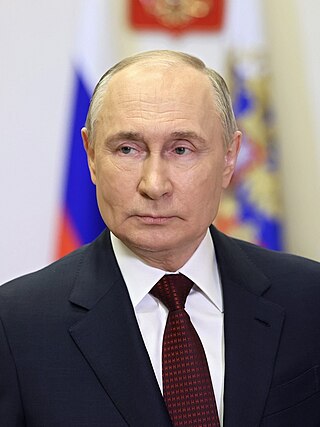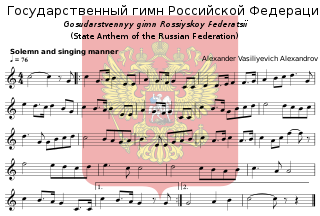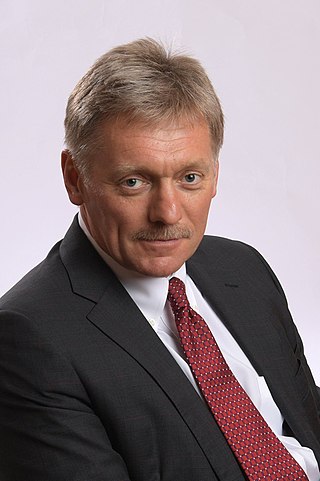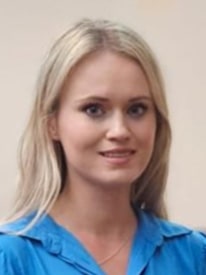
Vodka is a clear distilled alcoholic beverage. Different varieties originated in Poland, Russia, and Sweden. Vodka is composed mainly of water and ethanol but sometimes with traces of impurities and flavourings. Traditionally, it is made by distilling liquid from fermented cereal grains and potatoes since the latter was introduced in Europe in the 18th century. Some modern brands use corn, sugar cane, fruits, honey, and maple sap as the base.

Vladimir Vladimirovich Putin is a Russian politician and former intelligence officer who is the president of Russia. Putin has held continuous positions as president or prime minister since 1999: as prime minister from 1999 to 2000 and from 2008 to 2012, and as president from 2000 to 2008 and since 2012. He is the longest-serving Russian or Soviet leader since Joseph Stalin.

The "State Anthem of the Russian Federation" is the national anthem of Russia. It uses the same melody as the "State Anthem of the Soviet Union", composed by Alexander Alexandrov, and new lyrics by Sergey Mikhalkov, who had collaborated with Gabriel El-Registan on the original anthem. From 1944, that earliest version replaced "The Internationale" as a new, more Soviet-centric and Russia-centric Soviet anthem. The same melody, but without any lyrics, was used after 1956. A second version of the lyrics was written by Mikhalkov in 1970 and adopted in 1977, placing less emphasis on World War II and more on the victory of communism, and without mentioning Joseph Stalin by name.

Dmitry Nikolayevich Kozak is a Russian politician who has served as the Deputy Kremlin Chief of Staff since 24 January 2020. He previously served as the Deputy Prime Minister of Russia from 2008 to 2020. He has the federal state civilian service rank of 1st class Active State Councillor of the Russian Federation.
Russian hip hop refers to hip hop music recorded in Russia or in the Russian language in former Soviet states such as Ukraine, Belarus, and Kazakhstan. Hits by Russian rappers are included in the soundtracks of some PC-games and have formed part of several popular internet memes.
Neo-Stalinism is the promotion of positive views of Joseph Stalin's role in history, the partial re-establishing of Stalin's policies on certain or all issues, and nostalgia for the Stalinist period. Neo-Stalinism overlaps significantly with neo-Sovietism and Soviet nostalgia. Various definitions of the term have been given over the years.

Nashi was a political youth movement in Russia, which declared itself to be a democratic, anti-fascist, anti-"oligarchic-capitalist" movement. Nashi was widely characterized as a pro-Putin outfit, with the Bureau of Investigative Journalism describing it as "Putin's private army". Western critics have detected a "deliberately cultivated resemblance to" the Soviet Komsomol or to the Hitler Youth and dubbed the group "Putinjugend".

Russian nationalism is a form of nationalism that promotes Russian cultural identity and unity. Russian nationalism first rose to prominence as a Pan-Slavic enterprise during the 19th century Russian Empire, and was repressed during the early Bolshevik rule. Russian nationalism was briefly revived through the policies of Joseph Stalin during and after the Second World War, which shared many resemblances with the worldview of early Eurasianist ideologues.

Dmitry Sergeyevich Peskov is a Russian diplomat and the press secretary for Russian president Vladimir Putin.
Russian web brigades, also called Russian trolls, Russian bots, Kremlinbots, or Kremlin trolls are state-sponsored anonymous Internet political commentators and trolls linked to the Government of Russia. Participants report that they are organized into teams and groups of commentators that participate in Russian and international political blogs and Internet forums using sockpuppets, social bots, and large-scale orchestrated trolling and disinformation campaigns to promote pro-Vladimir Putin and pro-Russian propaganda.
Russian studies is an interdisciplinary field crossing politics, history, culture, economics, and languages of Russia and its neighborhood, often grouped under Soviet and Communist studies. Russian studies should not be confused with the study of the Russian literature or linguistics, which is often a distinct department within universities.
Happy Birthday, Mr. Putin! is an English title of the erotic calendar, released by the Russian publishing house "Fakultet" for the 58th birthday of Vladimir Putin on 7 October 2010. The calendar features twelve semi-nude female students of the Faculty of Journalism at Moscow State University (MSU), each for every month, with a short message. The print run consisted of 50,000 copies.
Kimberly Marten is an author and scholar specializing in international security, foreign policy, Russia, and environmental politics. She held the 5-year-term Ann Whitney Olin Professorship of Political Science at Barnard College from 2013 to 2018, and then returned to chair the Barnard Political Science Department for a second time from 2018-2021. She was the director of the Program on U.S.-Russia Relations at Columbia University’s Harriman Institute from 2015 to 2019, and the Harriman Institute published a profile of her career. She is a member of the Council on Foreign Relations and the International Institute for Strategic Studies, and a frequent media commentator.

The propaganda of the Russian Federation promotes views, perceptions or agendas of the government. The media include state-run outlets and online technologies, and may involve using "Soviet-style 'active measures' as an element of modern Russian 'political warfare'". Notably, contemporary Russian propaganda promotes the cult of personality of Vladimir Putin and positive views of Soviet history. Russia has established a number of organizations, such as the Presidential Commission of the Russian Federation to Counter Attempts to Falsify History to the Detriment of Russia's Interests, the Russian web brigades, and others that engage in political propaganda to promote the views of the Russian government.

The social phenomenon of nostalgia for the era of the Soviet Union, can include its politics, its society, its culture and cultural artifacts, its superpower status, or simply its aesthetics.

Putinism is the social, political, and economic system of Russia formed during the political leadership of Vladimir Putin. It is characterized by the concentration of political and financial powers in the hands of "siloviks", current and former "people with shoulder marks", coming from a total of 22 governmental enforcement agencies, the majority of them being the Federal Security Service (FSB), Ministry of Internal Affairs of Russia, Armed Forces of Russia, and National Guard of Russia. According to Arnold Beichman, "Putinism in the 21st century has become as significant a watchword as Stalinism was in the 20th."
Conservatism in Russia is a broad system of political beliefs in Russia that is characterized by support for Orthodox values, Russian imperialism, statism, economic interventionism, advocacy for the historical Russian sphere of influence, and a rejection of late modernist era Western culture.

Ruscism, also known as Rashism, Russism, or Russian fascism, is a derogatory term used by a number of scholars, politicians and publicists to describe the political ideology and the social practices of the Russian state in the late 20th and early 21st centuries, especially during the rule of Vladimir Putin. "Ruscism" and "Russism" are portmanteaus which combine the words 'Russian' and 'fascism'; "Rashism" is a rough transcription of the Ukrainian equivalent. It is also used in reference to the ideology of Russian military expansionism, and has been used as a label to describe an undemocratic system and nationality cult mixed with ultranationalism and a cult of personality. That transformation was described as based on the ideas of the "special civilizational mission" of the Russians, such as Moscow as the third Rome and expansionism, which manifests itself in anti-Westernism and supports regaining former lands by conquest. The term "Rashist" is also widely used by Ukrainian officials and media to more generally identify members and supporters of the Russian Armed Forces.

"Takogo, kak Putin!" is a 2002 Russian propaganda pop song written by Alexander Yelin and performed by the all-girl band Poyushchie vmeste. The song, written during the first term of Russian president Vladimir Putin (2000–2004), sarcastically idealises Putin; however, contrary to the song's satirical intentions, the song was officially used by Putin's 2004 re-election campaign, and the satirical undertones were largely unnoticed and ignored by the Russian populace. The song was a one-hit wonder and is considered one of the most notable songs in the cult of personality surrounding Putin.

Jade Selena McGlynn is a British researcher, lecturer, linguist, historian, and author specialising in modern Eastern Europe, particularly Russia under Vladimir Putin. As research fellow at the Department of War Studies, King's College London, her work has focussed on the Russo-Ukrainian War since 2014, as well as identity construction, memory politics, propaganda, and state-society relations in the Russian Federation. McGlynn is also affiliated with the Faculty of Medieval and Modern Languages at the University of Oxford.

















